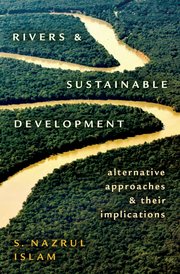By Darryl Knudsen, International Rivers Executive Director

As the executive director of International Rivers, I highly recommend Rivers and Sustainable Development: Alternative Approaches and their Implications by Professor S. Nazrul Islam (2020).
Whether you are just getting started on your journey to becoming a river activist or you are already an expert in water policy and sustainable development, this book will widen your knowledge and better equip you in the fight of our lifetime.
Professor Islam’s book provides a timely and compelling case that the best way to manage rivers in line with achieving sustainable development goals is to allow rivers to flow naturally without the restraints of artificial barriers such as levees, or embankments, something he calls the “Ecological and Open policy approach.” He argues that the widespread practice of using industrial and artificial developments to divert, block, or disrupt a river’s flow — something he dubs the “Commercial and Cordon policy approach” prioritizes commercial gains while ignoring the long-term negative ecological and ultimately human consequences of doing so.
Islam’s purpose is to support countries to make informed policy decisions about river management, many of which can be counterintuitive. I particularly appreciate his acknowledgment of the important role civil society organizations and grassroots movements must play in setting the policy agenda if it is to be fair, equitable, and successful.
This book is eminently readable, keeping the research accessible to increase participation in river policy worldwide. Islam impressibly weaves a varying range of case studies to illustrate the implications of both the Ecological and Commercial river policy approaches. Together, these case studies demonstrate how ecologically centered policy agendas promote true economic, social, and environmental sustainability and are thus instrumental in achieving the United Nations’ 2030 Sustainable Development Goals (SDG).
This work is a welcome addition to the ever-growing evidence base that can be used to fight against the inequitable impacts of rapid ecological degradation, human rights abuses, and climate injustice at large.
Rivers and Sustainable Development (2020) goes hand in hand with our work at International Rivers. Most recently, this work echoes our latest report and online global call Rivers for Recovery. Like the book, we make the case that protecting rivers for environmental and social justice is the necessary path in a Covid-19 recovery. At International Rivers, we work to uplift river communities, specifically Indiengious peoples, to support their own ecologically minded river governance. Thus, as the book makes clear, understanding the synergies between human rights, social justice and environmental sustainability is both essential and critically important.

